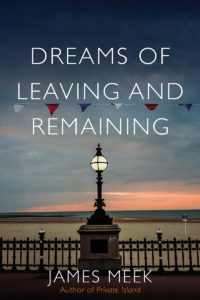For many newspaper readers in the United States, Brexit feels like the story that simply – almost perversely, given our short attention spans and massive self-absorption – refuses to end: a baffling saga of tortuous parliamentary procedure, protracted negotiations, political flameouts, and missed deadlines, requiring minute-by-minute updates from the international press.
 In a concise book focused on the crisis’s origins, journalist and novelist James Meek leaves behind the daily news cycle and offers a different perspective on Brexit by examining it within the context of the United Kingdom’s collective dreamscape: the reservoir of myths, memories, and promises that inform the emotional lives of both Leavers and Remainers. Dreams of Leaving and Remaining (Verso Books, 2019) regards the referendum of 2016 as an emotional decision, not a logical one – but that, in and of itself, doesn’t necessarily mean Brexit was a foolish choice in the usual sense that its supposedly rational opponents claim.
In a concise book focused on the crisis’s origins, journalist and novelist James Meek leaves behind the daily news cycle and offers a different perspective on Brexit by examining it within the context of the United Kingdom’s collective dreamscape: the reservoir of myths, memories, and promises that inform the emotional lives of both Leavers and Remainers. Dreams of Leaving and Remaining (Verso Books, 2019) regards the referendum of 2016 as an emotional decision, not a logical one – but that, in and of itself, doesn’t necessarily mean Brexit was a foolish choice in the usual sense that its supposedly rational opponents claim.
Meek’s starting point is the legend of Saint George and the Dragon, which he identifies as one of Great Britain’s two foundational folk tales – the easier of the two: a straightforward, purgative moment of victory over an external enemy within a simplified world where long-term plans and problems don’t matter. Thanks to influential right-wing demagogues, the “vote on whether Britain should leave the European Union was sold to the electorate as a St George moment, a swordthrust in the dragon’s heart that would end the suffering of all good people.”
Meek, a Remainer, nevertheless believes that, in a European Union increasingly dominated by cutthroat high finance, “it would have been perfectly possible to make a reasonable case for Britain leaving the EU, and to come up with a sound, twenty-year programme for leaving it.” Instead, the Conservative Party’s David Cameron put forth – as a concession to traditional Tory voters who had begun to drift toward the UK Independence Party – an irresponsibly undetailed referendum premised on his own inability to picture any circumstance in which a plurality of Britons would actually choose to throw away their country’s all-access pass to the European Single Market, whose GDP matches that of the United States. Ironically, the imprecise nature of the proposal allowed UK residents to imagine the withdrawal in whatever terms they liked, which in turn led to large voting blocs that stood to lose out on significant EU subsidies joining the Brexit camp against their self-interest, including (most famously) farmers.
The UK’s legacy industries – farming, fishing, mining – occupy a space in the national psyche greater than their current economic output, and this holds true in discussions of Brexit. Meek’s book, comprised of essays previously published in the London Review of Books intermixed with new reflections, operates partly as a travelogue, bringing him to the EU-sustained farmlands of Norfolk, where one grower acknowledges that Brexit “would be bad for farming, but there are some things more important than farming”; to the largely disused and now privatized seaport of Grimsby, where old trawlers blame the EU’s (environmentally necessary) prohibition on overfishing for unemployment; to the hospitals of Leicestershire, staggered by NHS cuts; and to a relocated Cadbury chocolate factory, formerly of Somerdale, before tax incentives and cheap labor in Poland prompted a move. (The Poles appreciate the foreign investment, but they recognize neocolonialism when they see it.)
Meek’s research missions recall the flood of journalistic pilgrims, after Donald Trump’s election, to the American Heartland, where reporters have sought ever since to comprehend the resentments, tragedies, and follies of rural voters who helped put a senile billionaire in the White House. Written alternately by condescending, solution-free liberals and by elite crypto-conservatives all too eager to “give in” to Trump’s program of white nationalism on behalf of their prejudiced inferiors, the stateside tales of postindustrial dislocation mirror experiences across the pond, but Meek, in his prescriptions for the UK’s deplorables, refuses to advocate either for continued economic punishment or for cultural appeasement.
To Meek, the enlightened Remainer is equally a figure of pity, now stranded in a nation that suddenly feels as alien to him as it did to the Leaver whose aggrieved disorientation within multicultural Britain gave rise to Brexit in the first place. The Remainer’s cosmopolitan dream has died, and just as abruptly, his political philosophy seems to have started to fray at the edges.
“British liberals like to see support for remaining in the EU as a marker, of and by itself, of good universal values: openness, receptiveness to other cultures and ideas, freedom for people to move and work in different places, widely pooled security,” Meek writes. “Indeed, Britain in the EU does approach these values more nearly than Britain on its own. But they aren’t applied universally. Britain, on its own, is an exclusionary, overwhelmingly white, post-Christian society; Britain in the EU is part of a larger, overwhelmingly white, post-Christian society that still excludes fourteen out of fifteen of the world’s population from freely moving, living or working there.”
Remainers, consequently, are “firm on their insistence on free movement within Europe, firm on the rights of migrants and refugees, and vague on the ideal degree of permeability of the external borders of the jurisdiction in which they live.” They’re equally vague on how they might reconcile their support for universal principles – LGBTQ rights, women’s rights, animal rights – with the value they ascribe to the uniqueness of local cultures, which, in the liberal worldview, possess some right to self-determination.
While Leavers yearn for a return to a pre-Thatcher form of paternalistic one-nationism that the leading Brexiteers only pretend to espouse, the Remainers prefer to imagine global capitalism as a meritocracy based on tolerance and opportunity for all. Both sides are delusional. The great dream of the liberals, which has lost some of its luster in recent years, arrived upon the fall of the Soviet Union: “democracy and free markets,” as Meek puts it. This stale slogan offered little in the face of Brexit’s imaginative temptations – perhaps it wasn’t the right one to begin with.
According to Meek, it should have been “democracy, trade, and fairly shared wealth.” In his view, the second great British myth is that of Robin Hood: stealing from the rich and giving to the poor – a legend “crystallised into reality” by taxation and the modern welfare state. But more recently, the right has repurposed even Robin Hood: conservatives’ tall tales of the luxurious lives of welfare queens and on-the-dole fat cats have managed to convince the public that tax cuts – by allowing ordinary, hardworking people to reclaim their rightful earnings from the greedy clutches of single mothers, retirees, and foreigners – constitute the ultimate act of just redistribution.
As Meek points out, Robin Hood was never much of a socialist anyway – his banditry ultimately did nothing to overturn the imbalance of power in British society that required his back-end intervention. Still, to the author, Sherwood Forest at least makes for a stable mythological foundation for a political system, because Robin Hood’s work, unlike Saint George’s, never ended: it was not a one-time heroic event but a constant practice. Projected into politics, Saint George tends to conjure ethical dualism and scapegoating.
But if the politicians of the left hope to win as storytellers, they may need a new populist myth, based not on redistribution but on liberation. This could mean taking back Saint George and changing his foe’s identity. The immigrants, after all, never were the dragon, but perhaps the multinational corporations really were. In the UK, the Remainers knew the first part, but how many could admit the second?









